School-Work Alternation Projects
School - Work Alternation Project
IBBR - CNR / Naples
The role of the researcher
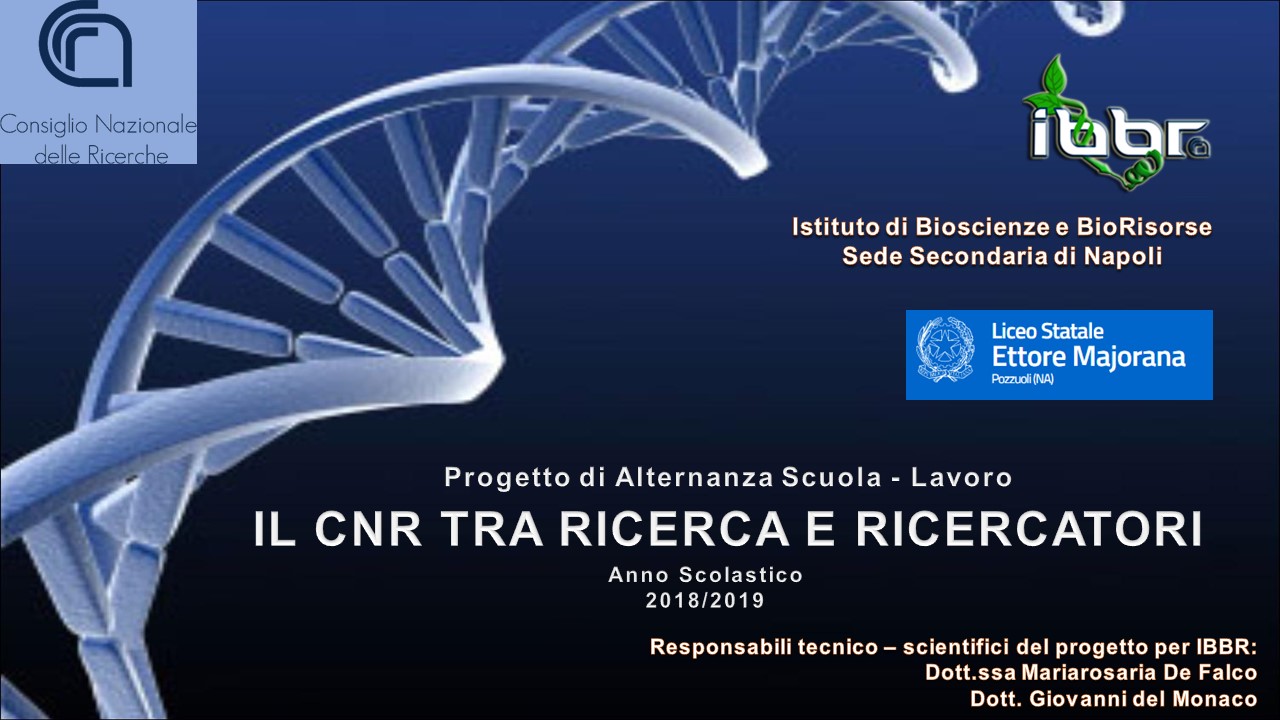
IBBR and Secondary School « Ettore Majorana» - Pozzuoli (NA)
Project: “The rule of the researcher”
School Year: 2017/2018
Scientific managers of the project: dr. Giovanni del Monaco - Dr. Mariarosaria De Falco
The project that involved the "Majorana" high school, an educational center of primary importance in the Campi Flegrei, and IBBR - Naples, was drawn up in order to provide female students with mainly scientific skills, in line with the profile of exit planned for scientific high school students. The design idea was to focus attention on the professional figure of the researcher, in this case, in the context of the National Research Council of Italy.
In line with the research areas of IBBR - Naples, based on the use and continuous implementation of innovative molecular techniques that allow both to advance in the knowledge of the physiological role of biological molecules and to develop new methods / products with strong applicative effects. This school-work alternation project allowed students to experience first-hand the progress in the field of model systems through a direct interaction with IBBR researchers.
Agreement n° 0004221, 24/05/2018
From DNA to proteins
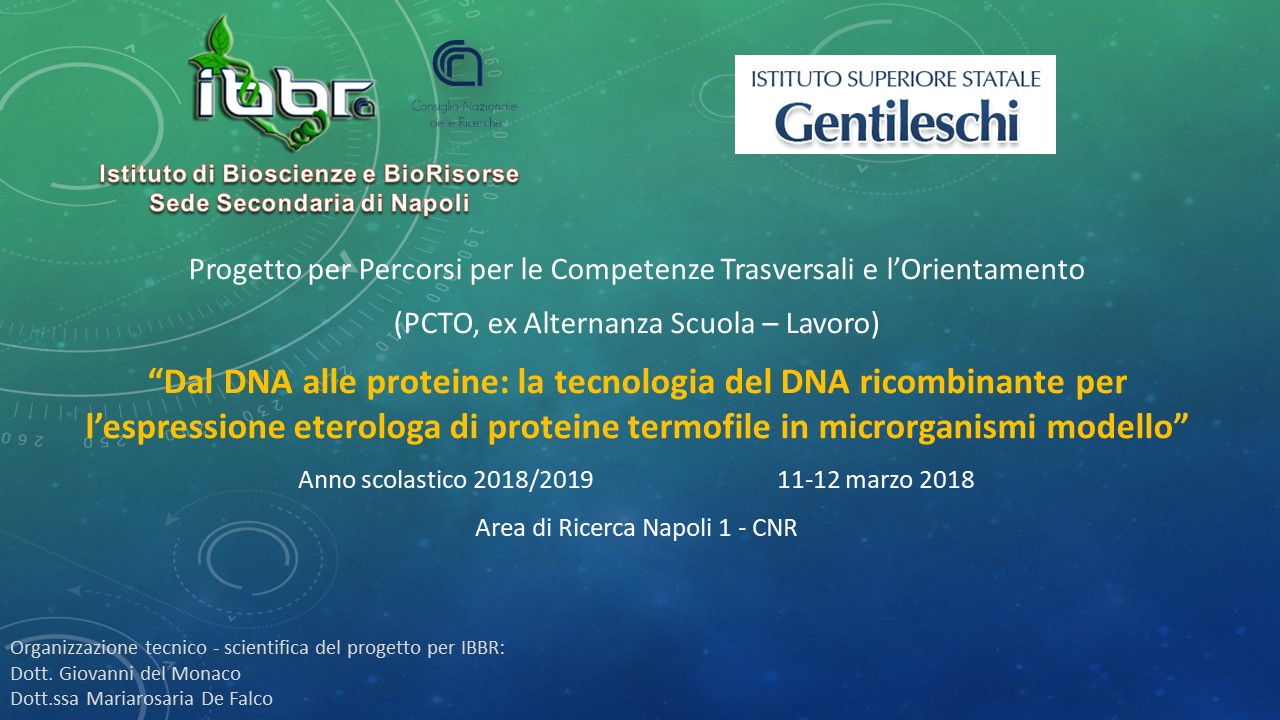
IBBR and Secondary School «Gentileschi» - Napoli
Project: “From DNA to proteins: recombinant DNA technology for the heterologous expression of thermophilic proteins in model microorganisms”
School Year 2018/2019
Scientific managers of the project: dr. Giovanni del Monaco - Dr. Mariarosaria De Falco
The project "From DNA to proteins: recombinant DNA technology for the heterologous expression of thermophilic proteins in model microorganisms" was created with the aim of illustrating the techniques to some third-year students of the "Gentileschi" secondary school of molecular biology used in recombinant DNA technology. Specifically, the project was set up with the aim of investigating the methods of production of thermophilic proteins of biotechnological interest in model microorganisms (Escherichia coli).
During the aforementioned training course, the experimental procedures were shown at a theoretical and practical level:
- to carry out molecular cloning (digestion of DNA by restriction enzymes, ligases, bacterial transformation);
- for the cultivation of model microorganisms (preparation of culture media);
- for protein analysis (polyacrylamide gel electrophoresis).
Agreement n° 0000436, 22/01/2019
Working with the invisible
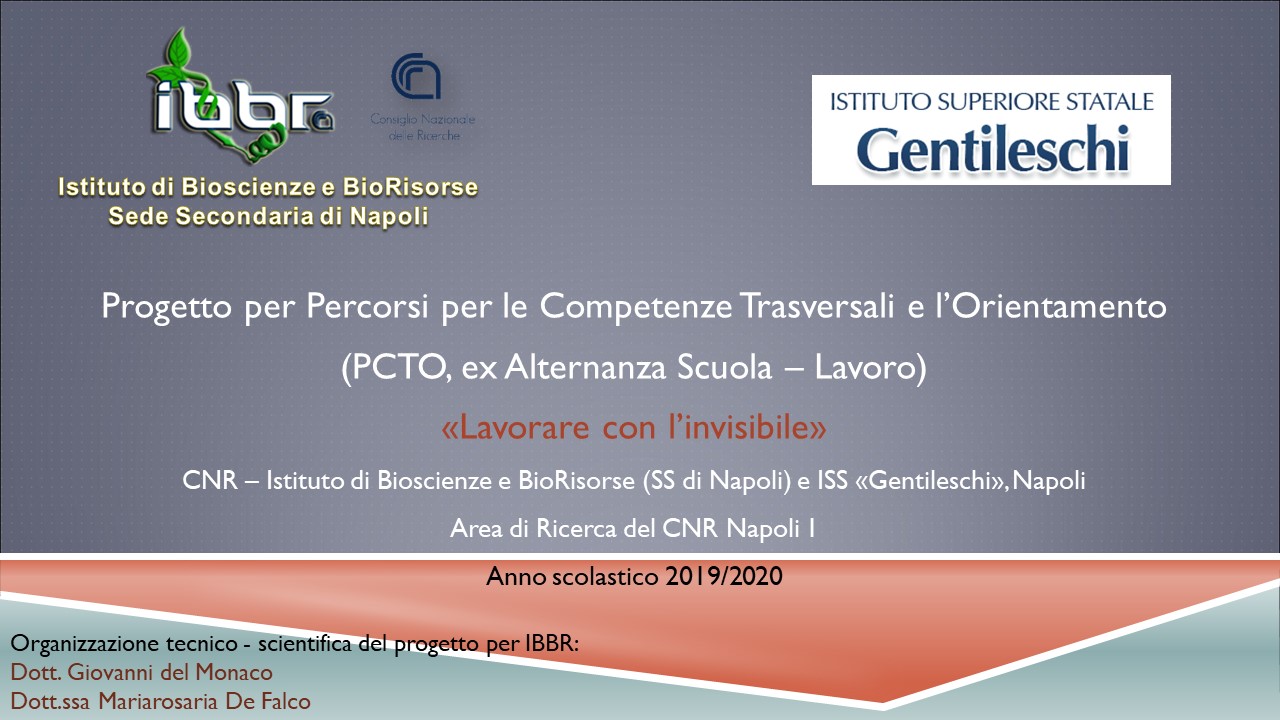
IBBR and Secondary School «Gentileschi» - Napoli
Titolo del progetto: “Working with the invisible”
School Year 2019/2020
Scientific managers of the project: dr. Giovanni del Monaco - Dr. Mariarosaria De Falco
The project "Working with the invisible" was born with the aim of illustrating to the students of some third year classes of the "Gentileschi" high school the microbiological techniques most used in scientific research laboratories, referring in more detail to the mesophilic organisms used as model-system in the biotechnological and biomolecular field.
Starting from the analytical description of the roles of the researcher and of the laboratory technician within the CNR, to explain the bases of scientific research activities, the project then moved on to introduce students to basic microbiology techniques, from sowing on agar medium to growth in liquid culture medium.
The children were shown the most used culture media; followed a microbial growth and the phases that characterize it, through the implementation of the operating procedures to follow bacterial growth in the laboratory.
Furthermore, the properties of two microorganisms widely used in the laboratory were been described: Escherichia coli and Bacillus subtilis.
A brief introduction to the characteristics of thermophilic microorganisms was also given.
Agreement n° 0008057, 06/11/2019
Analytical techniques for the study of thermophilic proteins
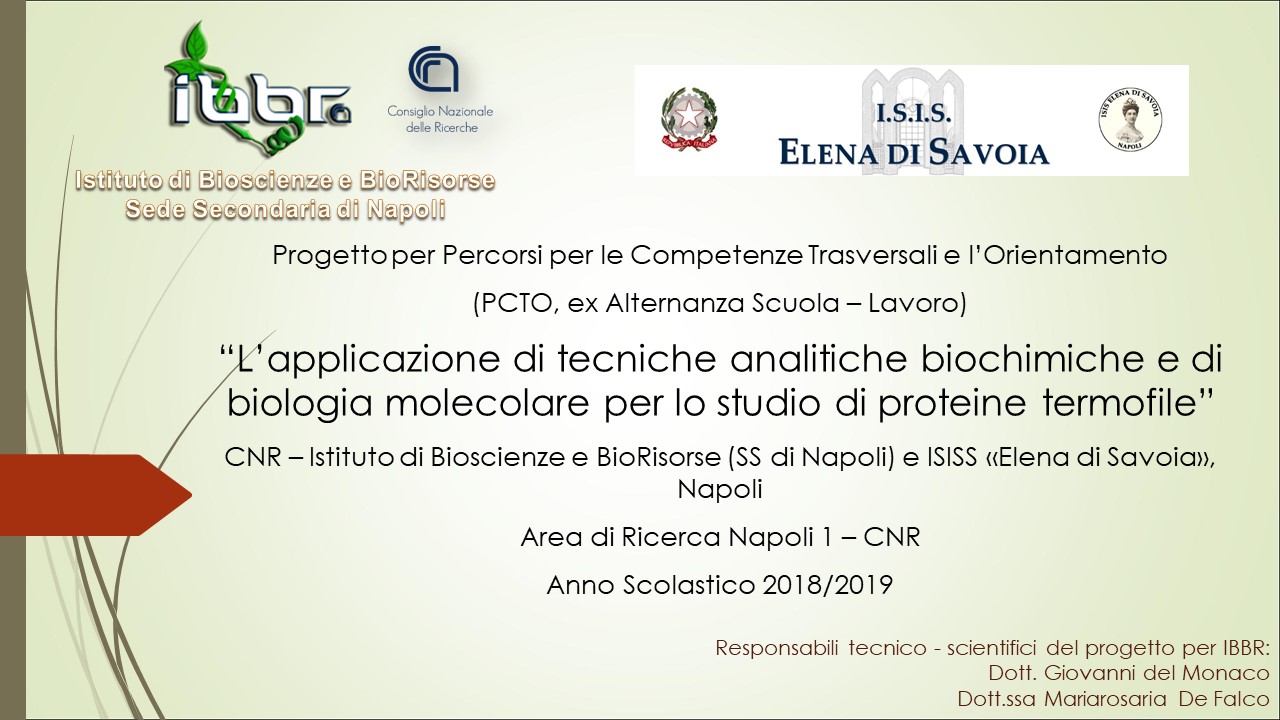
IBBR and Secondary School «Elena di Savoia» - Napoli
Project: “The application of biochemical and molecular biology analytical techniques for the study of thermophilic proteins”
School Year 2018/2019
Scientific managers of the project: dr. Giovanni del Monaco - Dr. Mariarosaria De Falco
The project "The application of biochemical and molecular biology analytical techniques for the study of thermophilic proteins" was created with the aim of illustrating the fundamental analytical techniques in biochemistry and molecular biology to the participating students of the ISIS "Elena di Savoia". used for the basic and applicative study of genes and proteins, referring in more detail to thermophilic organisms.
Illustrating the roles of the researcher and laboratory technician within the CNR, in order to explain the bases of scientific research activities, we then went on to deepen various techniques, widely used in the biochemical and biomolecular fields, at the gene and protein.
Therefore, electrophoretic techniques, for nucleic acids and proteins, chromatographic techniques, spectroscopic techniques, recombinant DNA technology, CRISPR / Cas9 technology have been described.
The properties that make biomolecules from thermophilic organisms interesting from a biotechnological and industrial point of view have also been described.
Agreement n. 0003434, 06/05/2019
Scientific communication in public events
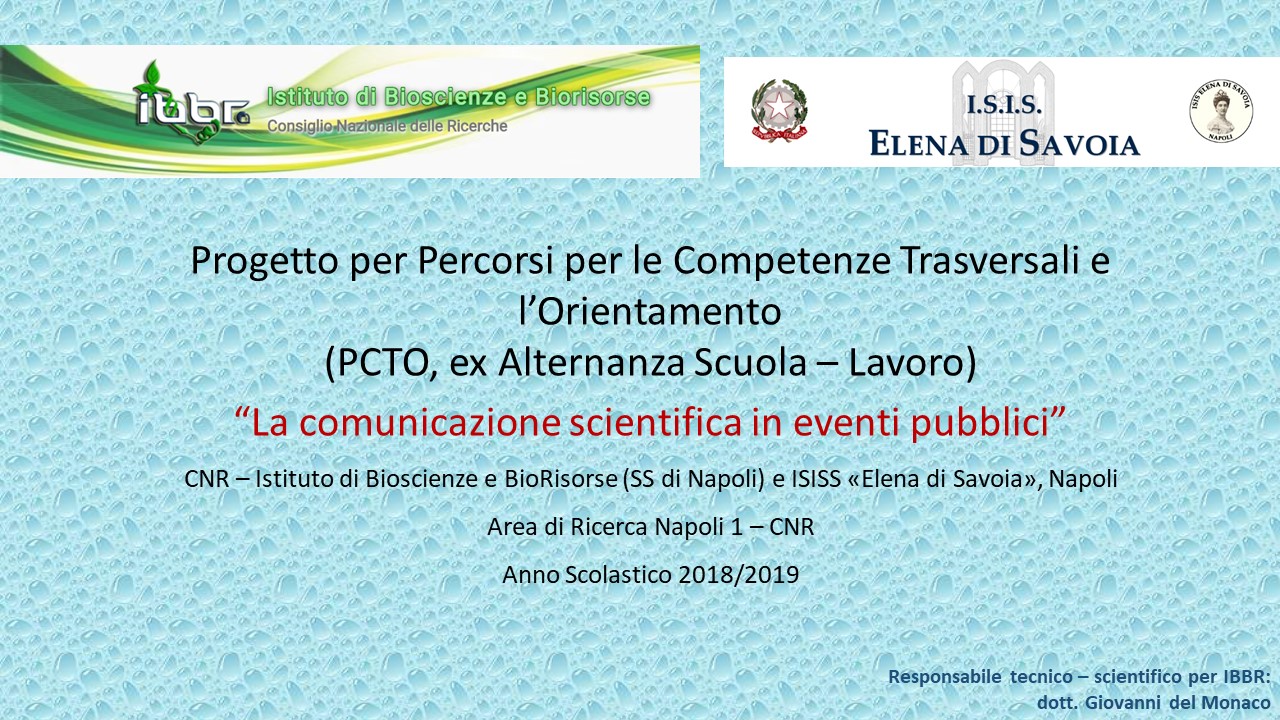
IBBR and Secondary School «Elena di Savoia» - Napoli
Project: “Scientific communication in public events”
School Year 2019/2020
Scientific manager of the project: dr. Giovanni del Monaco
Communication is a cornerstone in the scientific field: it is of fundamental importance that every new knowledge, every new page of the immense book of scientific knowledge is disseminated, and not only to professionals in the sector. In this context, public events of an informative nature represent an extremely useful means for this purpose, allowing a very wide and varied audience to come into direct contact with national and international scientific realities.
For this reason, the present School-Work Alternation project "Scientific communication in public events" was born, aimed at providing participating students with the tools and methods useful for spreading technical-scientific knowledge to a non-expert public in the sector.
Agreement n° 0008555, 19/11/2019
Biotechnology of extremophiles for health and the environment
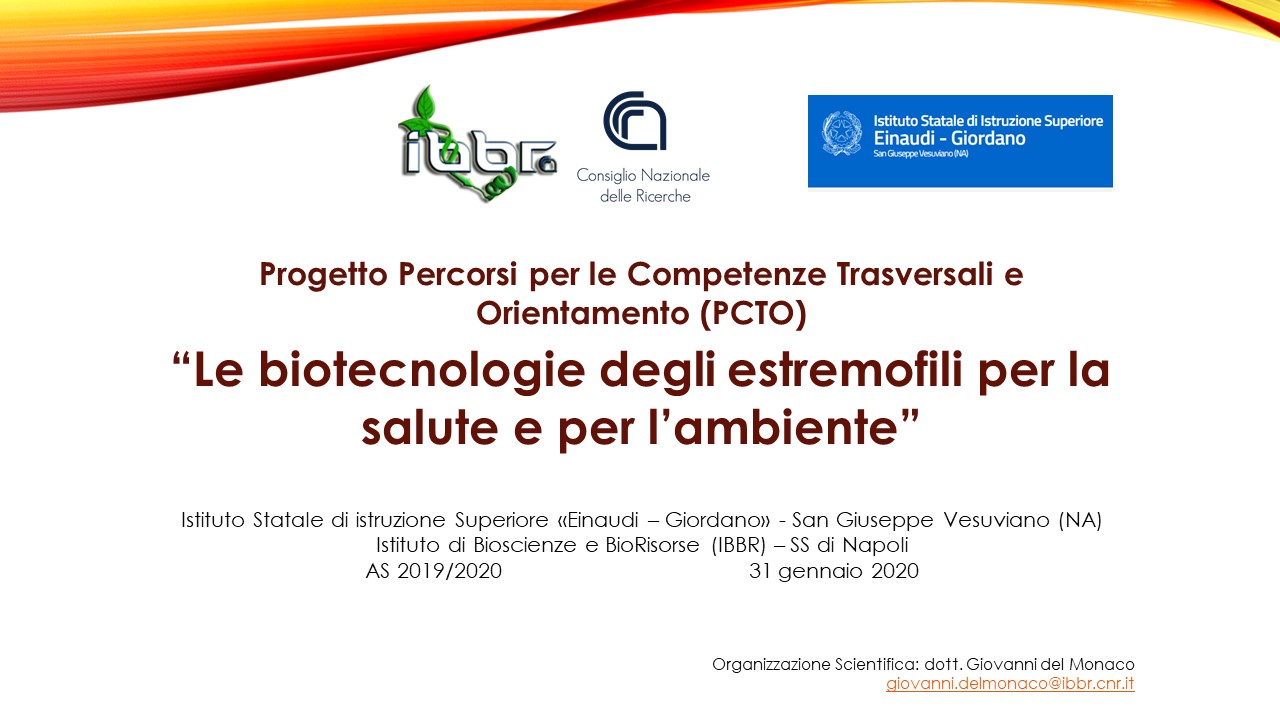
IBBR and Secondary School «Einaudi - Giordano» - San Giuseppe Vesuviano (NA)
Project: “Biotechnology of extremophiles for health and the environment”
School Year 2019/2020
Scientific coordinator of the project: dott. Giovanni del Monaco
Bacteria have always been a source of biomolecules that have found, over the course of history, important applications in various fields, always aimed at improving both the quality of life of humans and living beings in general, and the well-being of the environment in which we live. In this regard, biomolecules (enzymes, peptides, small organic biomolecules) isolated from microorganisms, and not only extremophiles, that is, adapted to live in extreme environmental conditions of pH, salinity, temperature, have shown biochemical properties such as to be more applicable to industrial processes, experimental research protocols, compared to their mesophilic counterparts.
In this context, the PCTO project "Biotechnology of extremophiles for health and the environment" is launched, aimed at showing the students involved some lines of research specialized in the study:
- of thermophilic microorganisms for the detection of enzymatic activities potentially useful from an industrial point of view;
- of psychrophilic microorganisms for the identification of small molecules with industrially attractive properties.
Agreement n° 0010050, 31/12/2019
Working with the invisible - the extreme greatness of the extremely small
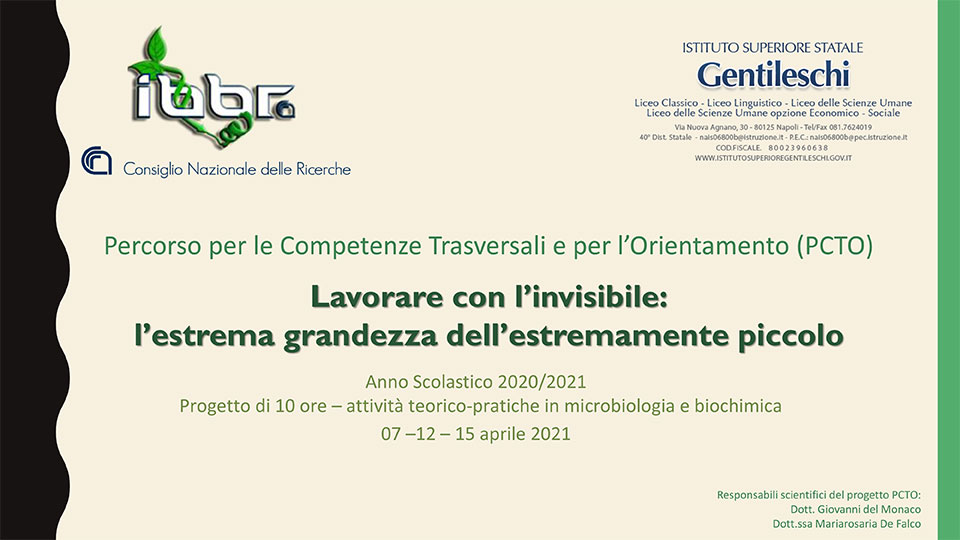
School Year 2020/2021
Scientific coordinator of the project: dott. Giovanni del Monaco
The project "Working with the invisible - the extreme greatness of the extremely small" was born with the aim of illustrating to high school students the microbiological techniques most used in scientific research laboratories, referring in more detail to mesophilic organisms used as model system in the biotechnological and biomolecular field.
Starting from the analytical description of the roles of the researcher and laboratory technician within the CNR, to explain the bases of scientific research activities, the project then wanted to introduce students to basic microbiology techniques, from sowing on agar medium to growth in liquid culture medium, up to the description of the methods for calculating the concentration of a bacterial culture by means of scalar dilutions.
This is followed by the description of the culture media most used in research laboratories, the microbial growth and the phases that characterize it, the operating methods for following bacterial growth in the laboratory.
Electrophoretic and spectroscopic techniques for the study of recombinant proteins were then shown.
Furthermore, the project described the properties of two microorganisms widely used in the laboratory: Escherichia coli and Bacillus subtilis; a brief introduction was also given to the characteristics of thermophilic microorganisms.
Agreement n° 0008401, 29/12/2020
Bacteria in the laboratory: tool for the study of proteins
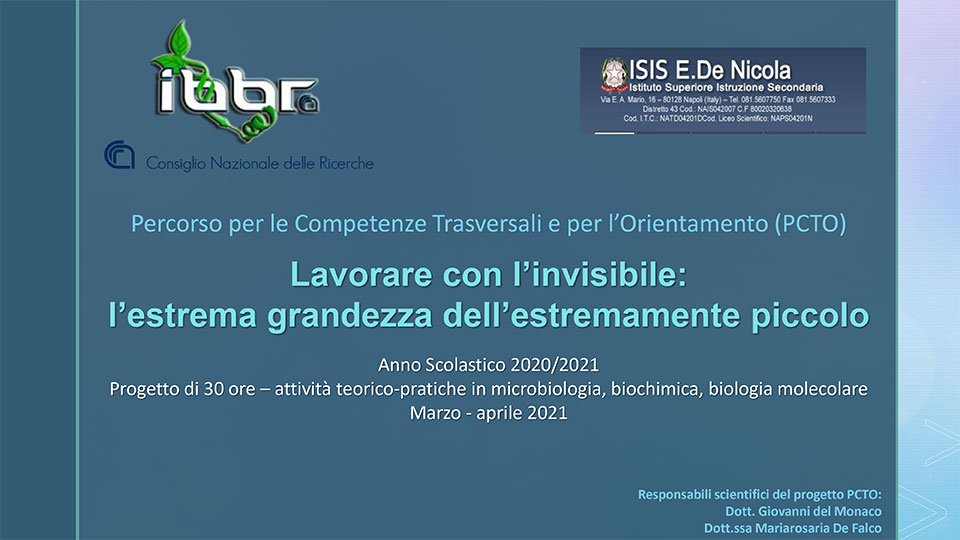
School Year 2020/2021
Scientific coordinator of the project: dott. Giovanni del Monaco
The project "Bacteria in the laboratory: tool for the study of proteins" was created with the aim of illustrating to high school students the microbiological techniques most used in scientific research laboratories, referring in more detail to the mesophilic organisms used as a model system. in the biotechnological and biomolecular fields. In this regard, the properties of two microorganisms widely used in the laboratory have been described: Escherichia coli and Bacillus subtilis.
The project was born with the aim of introducing students to basic microbiology techniques, from sowing on solid soil to growing in liquid culture medium, up to the description of the methods for calculating the concentration of a bacterial culture by means of scaled dilutions.
The most used culture media, the phases that characterize the microbial growth, the operating procedures for following bacterial growth in the laboratory (spectroscopic techniques) were presented.
The electrophoretic techniques used for the study of recombinant proteins were also shown.
Finally, the biotechnological importance of thermophilic microorganisms was briefly introduced.
Agreement n° 8405, 30/12/2020




